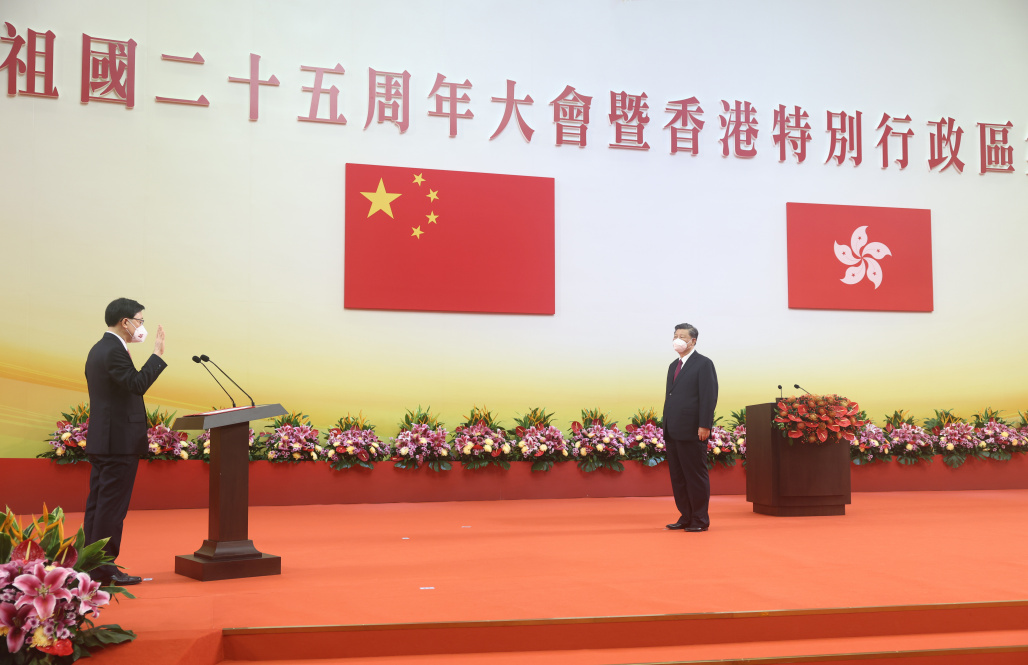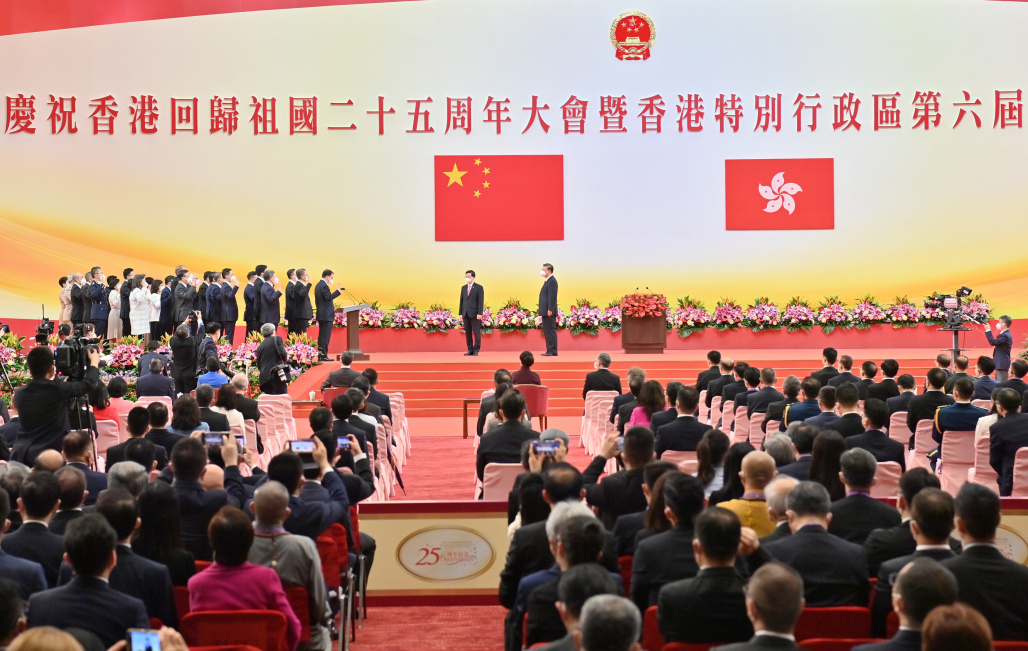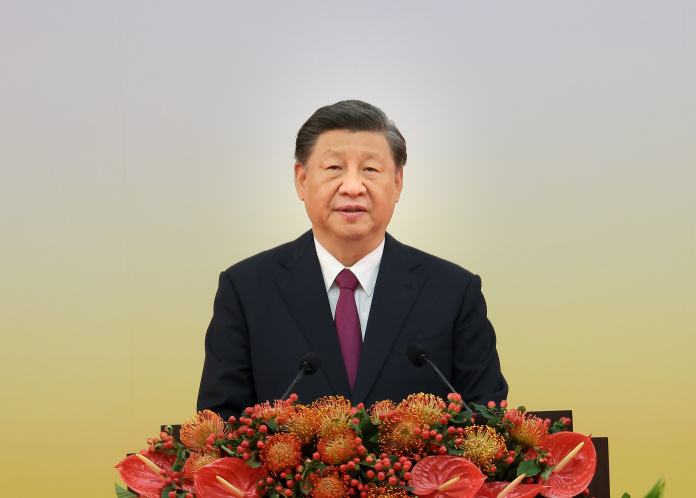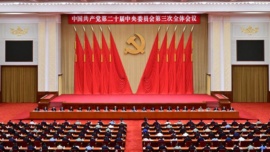Two important speeches were made by Chinese President Xi Jinping, who visited Hong Kong on the afternoon of June 30 and in the morning of July 1 to preside over the inauguration ceremony of the new Chief Executive John Lee and his governing team, including principal officials and members of the Executive Council.
On the afternoon of June 30, immediately after the arrival of President Xi Jinping by the High Speed Rail, he delivered a short but an important speech. First, he highlighted that the Hong Kong model of “one country, two systems” would continue to grow – a short remark that paved the way for his profound elaboration of how “one country, two systems” can and will develop further in his speech on the next day. Second, the President emphasized that Hong Kong remains vibrant and that it is “rising from the ashes” after the city had experienced challenges. Third, for the first time in his speeches on Hong Kong, President Xi referred to Hong Kong as a contributor to the Chinese renaissance – an indication that Hong Kong remains economically significant to its motherland, the People’s Republic of China (PRC).
On the morning of July 1, President Xi gave another longer but a particularly important speech immediately after John Lee swore in as the new Chief Executive.
The President first referred to the Opium War that constituted a humiliation to China as Hong Kong was ceded forcefully, and then he mentioned the leadership of the Communist Party of China (CPC) in the turbulent struggle of the Chinese people for one hundred years. Amid this struggle, the Hong Kong comrades had “blood and pulse” connected with the motherland.
President Xi’s remarks here were nationalistically significant. He reminded the people of Hong Kong that Hong Kong was part of the national humiliation of the Qing dynasty, whose ramshackle history had to be overturned by the CPC in its long and hard struggle.

The President then turned to the positive and functional role of Hong Kong in being “a bridge and a window” for the PRC’s modernization after its sovereignty return to the motherland. As such, Hong Kong has to integrate into the national strategy and planning wile maintaining its high degree of freedom and openness with the international world.
President Xi recognized the positive achievements of Hong Kong, but he encouraged the city to remain open vis-à-vis the outside world.
According to President Xi, although Hong Kong encountered various challenges, ranging from the international financial crisis to Covid-19 and to social turbulence, Hong Kong continues to make progress economically, financially and in the areas of trade and shipping, while its innovative technological industry is rising.
Given that President Xi visited the Science Park after his arrival at Hong Kong on June 30, he attaches immense importance to Hong Kong’s need to consolidate its innovative technology, especially in the process of economic integration with the Greater Bay Area, including Shenzhen’s Qianhai and Guangdong’s Nansha.
President Xi’s speech on July 1 was extremely important for Hong Kong in three main aspects.
First, he emphasized the persistent continuation of “one country, two systems,” which is a principle conforming to the interests of not only the PRC and the nation but also Hong Kong and Macau. He added that the principle has to be “persisted in the long term.”
Implicitly, President Xi bears in mind the strategy of the late Chinese leader Deng Xiaoping, who designed “one country, two systems” for Hong Kong and Macau to deal with the resolution of Taiwan’s question in the long run. As such, it remains to be seen how the PRC will produce any new measures to deal with Taiwan in the forthcoming Party Congress in October, although President Xi in his speeches in Hong Kong this time have not yet mentioned Taiwan.
Second, the President emphasized four necessary elements in the development of the “one country, two systems” in Hong Kong: accurately grasping the principle of “one country, two systems” by protecting national sovereignty, security and developmental interest; maintaining the principle of the center having “comprehensive jurisdiction” over Hong Kong which also enjoys a high degree of autonomy; the implementation of the idea of “patriots ruling Hong Kong;” and the necessity of retaining Hong Kong’s unique status and advantages.
On the protection of the central government’s sovereignty and national security, President Xi said the people of Hong Kong must understand and respect the mainland’s socialist system. By implication, he reminded those Hong Kong people, who previously supported Western-style democracy enthusiastically but blindly, to appreciate the mainland’s socialism and to avoid seeking to influence and to even change the mainland system.
On the compatibility of the mainland’s “comprehensive jurisdiction” over Hong Kong and the city’s high degree of autonomy, President Xi referred to the two aspects’ coexistence and organic relationships. The executive-led system in Hong Kong must be maintained and the relationships between the executive, legislature and judiciary should embrace not only checks and balances but also mutual accommodation. The judicial branch of the government continues to enjoy its right of adjudication. Hence, Hong Kong continues to possess its unique system of governance – a Hong Kong style of democracy different from total Westernization politically.
On the principle of “patriots ruling Hong Kong,” the President reiterated that no other country allows unpatriotic people in grasping the governing power. As such, the patriots in Hong Kong are expected to uphold the interests of the central government in Beijing.
On Hong Kong’s unique status and advantages, President Xi encouraged Hong Kong to develop and strengthen its role as an international and financial center, shipping center and trade center while maintaining the common-law system and efficient communication with the outside world to protect a free and open business environment.

From the perspectives of combining ideology with pragmatism, President Xi’s four-point necessity is both ideological in upholding the center’s national security interest and sovereignty on the one hand and pragmatic in unleashing the potentials of Hong Kong to increase its international competitiveness and attractiveness.
In the final analysis, President Xi expressed his four hopes for Hong Kong: the leadership of Hong Kong should increase its governing standards; Hong Kong should continue to develop its potential and momentum; Hong Kong should tackle livelihood issue; and Hong Kong should maintain harmony and stability.
On the improvement of governing capability, Chief Executive John Lee in his election campaign platform had already emphasized it – a reflection of the consensus between Lee and the central authorities. President Xi hopes that the private-sector talents of excellence should be recruited into the government while their national consciousness and international horizon should be enhanced. He also emphasized that good governance is the key to strengthening ruling capability.
On the need to unleash Hong Kong’s potential and momentum, the city must converge with the nation’s 14thfive-year plan, the Greater Bay Area development blueprint, and the One Belt One Road Initiative, while the central government fully supports Hong Kong to unleash its potentiality and vitality.
On the need to improve livelihood issues, the President explicitly mentioned the need for the youth to understand China, Hong Kong and the world while inculcating in them a higher sense of national pride and being the “master” of governing Hong Kong. The study, employment and residence of the young people must be assisted. As such, the top Chinese leadership understood that one of the underlying factors of the 2019 turbulence was the problems of youth discontent, poverty and immobility in the society.
On the necessity of maintaining harmony and stability, President Xi confidently said that Hong Kong cannot have chaos, and that chaos cannot occur at all. The political message is clear: the people of Hong Kong must learn a bitter lesson from the social and political turbulence in the past two decades and they should cherish harmony and stability from now on.
Overall, President Xi’s speeches are highly positive toward Hong Kong, which should continue to realize its need to improve and elevate the standards of governance, to tackle livelihood issues, to protect the nation’s sovereignty and national security interests, and to unleash its potentiality and maintain its economic momentum to develop its economy and international competitiveness. Hong Kong should make use of its motherland’s rise strategically, integrating with the Greater Bay Area, contributing to the Belt and Road Initiative, utilizing its strong connections with the international world to maintain the city’s functions as both a bridge and window of the PRC’s continuous modernization. If the “one country, two systems” in Hong Kong must continue, the people of Hong Kong should be confident and try their best to make the model work and successful, contributing immensely to the Chinese renaissance and fulfilling Deng Xiaoping and Xi Jinping’s vision that Hong Kong continues to contribute to China’s socialist modernization.





















